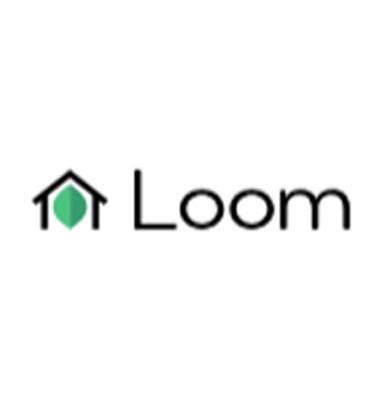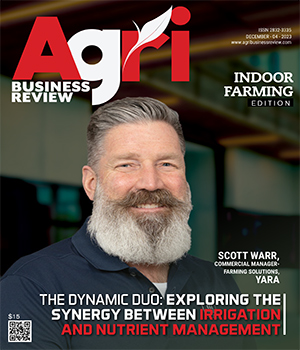The concept of indoor farming has been in the air for a while, and several companies have already ventured into the space.
Powered by automation, LED lighting, sensors, computer vision and digital technologies, indoor farming companies have succeeded in building big facilities focusing predominantly on greens and herbs. Most of the existing systems are large-scale units that require considerable investments beyond the reach of an average household while allowing users to grow specific types of plants under one roof.
 But what if someone wanted to grow vine plants such as tomatoes and cucumbers alongside carrots, peppers, or lettuces in their own house?
But what if someone wanted to grow vine plants such as tomatoes and cucumbers alongside carrots, peppers, or lettuces in their own house?
The CEO and founder of Loom, Tyler Casper, stumbled across a new niche for vertical farming while pursuing aerospace engineering and came up with an idea to address the need. Started as a personal project, the idea of developing a manufacturable home system for indoor farming for families, small companies, campuses or cafes bloomed into a full-grown business. Backed by the sharp business acumen of Manolya Rowe, the company’s COO of business operations and development, Loom’s team is now preparing to launch its first units for indoor farming, building prototypes with contract manufacturing partners.
“We aim to deliver a sleek, intuitive system for growing your favorite fresh produce from the comfort of your home,” says Tyler.
These plug-and-play units can be easily installed, and all a grower needs to do is plant the seeds in the nutrient solution. From there on, the system takes care of everything with minimal manual intervention. Harvesting home-grown nutrient-rich produce cannot get any easier!
Loom builds its prototypes with busy families in mind who appreciate innovations and would like to cultivate a personalized garden but don’t have much time, knowledge about planting or a backyard to grow plants all year round. Loom’s automated vertical farming units seamlessly fit into living spaces, regardless of space constraints, and grow plants on their own like a professional gardener, quietly working behind the scenes without requiring families to invest much time and effort.
Prioritizing an engineering approach, Loom builds its indoor farming units on the principles of hydroponics and aeroponics, where plants’ roots are either steeped in a nutrient solution or fed by nutrient mist. The units leverage automatic watering and lighting capabilities managed by Loom’s proprietary electronic control package. They are outfitted with cutting-edge technology like sensors and spectrum analyzers for humidity, temperature, pH level, electric conductivity, and nutrient solution upkeep, and are designed to be low-maintenance, scalable appliances.
With most consumers choosing to avoid plastic, Loom uses natural materials such as wood to offer a combination of aesthetics and cost-effectiveness. By keeping costs under control, it aims to build indoor farming units on par with larger systems, crafted with sustainability in mind.
While designing the prototypes, the team had to address multiple nuances of growing diverse crops in close compartments while ensuring different pH levels and nutrient and lighting requirements for diverse plants. The indoor farming units can also cope with emergencies such as pathogen outbreaks and electricity outages, making the growing process seamless for users. They will be paired with an application that can notify growers when their produce will be ripe and ready, provide real-time data on growing conditions, and even recommend recipes.
In Tyler’s perspective, indoor farming systems will be as ubiquitous as refrigerators or microwaves. Just like the fridge keeps food cold, these units will grow plants without clients having to delve into it.
Combining Tyler’s passion for the craft and Manolya’s business-savvy, technical mindset, Loom is innovatively redefining high-end indoor farming. Their ingenuity and forward-thinking approach set a new standard of excellence in the realm of vertical farming and food production.
Powered by automation, LED lighting, sensors, computer vision and digital technologies, indoor farming companies have succeeded in building big facilities focusing predominantly on greens and herbs. Most of the existing systems are large-scale units that require considerable investments beyond the reach of an average household while allowing users to grow specific types of plants under one roof.
 But what if someone wanted to grow vine plants such as tomatoes and cucumbers alongside carrots, peppers, or lettuces in their own house?
But what if someone wanted to grow vine plants such as tomatoes and cucumbers alongside carrots, peppers, or lettuces in their own house?The CEO and founder of Loom, Tyler Casper, stumbled across a new niche for vertical farming while pursuing aerospace engineering and came up with an idea to address the need. Started as a personal project, the idea of developing a manufacturable home system for indoor farming for families, small companies, campuses or cafes bloomed into a full-grown business. Backed by the sharp business acumen of Manolya Rowe, the company’s COO of business operations and development, Loom’s team is now preparing to launch its first units for indoor farming, building prototypes with contract manufacturing partners.
“We aim to deliver a sleek, intuitive system for growing your favorite fresh produce from the comfort of your home,” says Tyler.
These plug-and-play units can be easily installed, and all a grower needs to do is plant the seeds in the nutrient solution. From there on, the system takes care of everything with minimal manual intervention. Harvesting home-grown nutrient-rich produce cannot get any easier!
Loom builds its prototypes with busy families in mind who appreciate innovations and would like to cultivate a personalized garden but don’t have much time, knowledge about planting or a backyard to grow plants all year round. Loom’s automated vertical farming units seamlessly fit into living spaces, regardless of space constraints, and grow plants on their own like a professional gardener, quietly working behind the scenes without requiring families to invest much time and effort.
We aim to deliver a sleek, intuitive system for growing your favorite fresh produce from the comfort of your home
With most consumers choosing to avoid plastic, Loom uses natural materials such as wood to offer a combination of aesthetics and cost-effectiveness. By keeping costs under control, it aims to build indoor farming units on par with larger systems, crafted with sustainability in mind.
While designing the prototypes, the team had to address multiple nuances of growing diverse crops in close compartments while ensuring different pH levels and nutrient and lighting requirements for diverse plants. The indoor farming units can also cope with emergencies such as pathogen outbreaks and electricity outages, making the growing process seamless for users. They will be paired with an application that can notify growers when their produce will be ripe and ready, provide real-time data on growing conditions, and even recommend recipes.
In Tyler’s perspective, indoor farming systems will be as ubiquitous as refrigerators or microwaves. Just like the fridge keeps food cold, these units will grow plants without clients having to delve into it.
Combining Tyler’s passion for the craft and Manolya’s business-savvy, technical mindset, Loom is innovatively redefining high-end indoor farming. Their ingenuity and forward-thinking approach set a new standard of excellence in the realm of vertical farming and food production.
Company : Loom
Headquarters :
.. ManagementTyler Casper, CEO and Founder
Manolya Rowe, COO, Business Operations and Development
Thank you for Subscribing to Agri Business Review Weekly Brief



